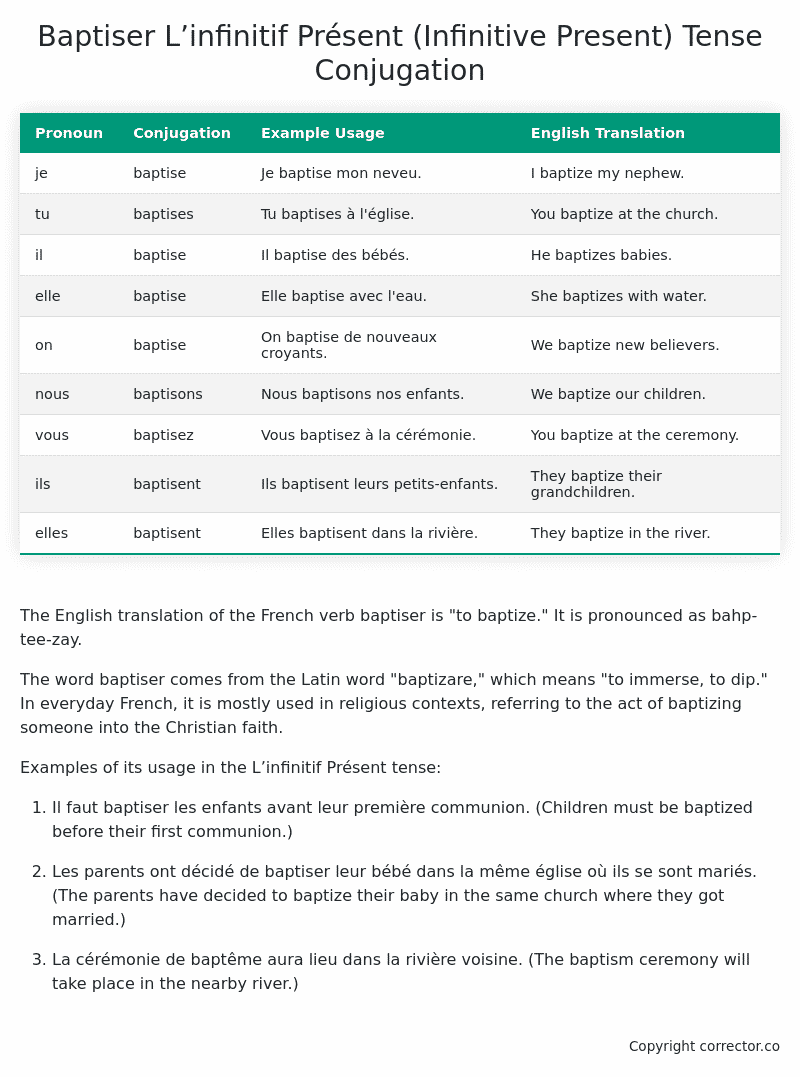L’infinitif Présent (Infinitive Present) Tense Conjugation of the French Verb baptiser
Introduction to the verb baptiser
The English translation of the French verb baptiser is “to baptize.” It is pronounced as bahp-tee-zay.
The word baptiser comes from the Latin word “baptizare,” which means “to immerse, to dip.” In everyday French, it is mostly used in religious contexts, referring to the act of baptizing someone into the Christian faith.
Examples of its usage in the L’infinitif Présent tense:
-
Il faut baptiser les enfants avant leur première communion. (Children must be baptized before their first communion.)
-
Les parents ont décidé de baptiser leur bébé dans la même église où ils se sont mariés. (The parents have decided to baptize their baby in the same church where they got married.)
-
La cérémonie de baptême aura lieu dans la rivière voisine. (The baptism ceremony will take place in the nearby river.)
Table of the L’infinitif Présent (Infinitive Present) Tense Conjugation of baptiser
| Pronoun | Conjugation | Example Usage | English Translation |
|---|---|---|---|
| je | baptise | Je baptise mon neveu. | I baptize my nephew. |
| tu | baptises | Tu baptises à l’église. | You baptize at the church. |
| il | baptise | Il baptise des bébés. | He baptizes babies. |
| elle | baptise | Elle baptise avec l’eau. | She baptizes with water. |
| on | baptise | On baptise de nouveaux croyants. | We baptize new believers. |
| nous | baptisons | Nous baptisons nos enfants. | We baptize our children. |
| vous | baptisez | Vous baptisez à la cérémonie. | You baptize at the ceremony. |
| ils | baptisent | Ils baptisent leurs petits-enfants. | They baptize their grandchildren. |
| elles | baptisent | Elles baptisent dans la rivière. | They baptize in the river. |
Other Conjugations for Baptiser.
Le Present (Present Tense) Conjugation of the French Verb baptiser
Imparfait (Imperfect) Tense Conjugation of the French Verb baptiser
Passé Simple (Simple Past) Tense Conjugation of the French Verb baptiser
Passé Composé (Present Perfect) Tense Conjugation of the French Verb baptiser
Futur Simple (Simple Future) Tense Conjugation of the French Verb baptiser
Futur Proche (Near Future) Tense Conjugation of the French Verb baptiser
Plus-que-parfait (Pluperfect) Tense Conjugation of the French Verb baptiser
Passé Antérieur (Past Anterior) Tense Conjugation of the French Verb baptiser
Futur Antérieur (Future Anterior) Tense Conjugation of the French Verb baptiser
Subjonctif Présent (Subjunctive Present) Tense Conjugation of the French Verb baptiser
Subjonctif Passé (Subjunctive Past) Tense Conjugation of the French Verb baptiser
Subjonctif Imparfait (Subjunctive Imperfect) Tense Conjugation of the French Verb baptiser
Subjonctif Plus-que-parfait (Subjunctive Pluperfect) Tense Conjugation of the French Verb baptiser
Conditionnel Présent (Conditional Present) Tense Conjugation of the French Verb baptiser
Conditionnel Passé (Conditional Past) Tense Conjugation of the French Verb baptiser
L’impératif Présent (Imperative Present) Tense Conjugation of the French Verb baptiser
L’infinitif Présent (Infinitive Present) Tense Conjugation of the French Verb baptiser (this article)
Struggling with French verbs or the language in general? Why not use our free French Grammar Checker – no registration required!
Get a FREE Download Study Sheet of this Conjugation 🔥
Simply right click the image below, click “save image” and get your free reference for the baptiser L’infinitif Présent tense conjugation!

Baptiser – About the French L’infinitif Présent (Infinitive Present) Tense
Forming the Infinitive Present
Common Everyday Usage Patterns
As a Verb’s Dictionary Form
After Modal Verbs
As an Imperative
In Infinitive Clauses
Interactions with Other Tenses
Present Tense
Future Tense
Conditional Tense
Passé Composé
Imperfect Tense
Subjunctive and Conditional Moods
Summary
Want More?
I hope you enjoyed this article on the verb baptiser. Still in a learning mood? Check out another TOTALLY random French verb conjugation!


